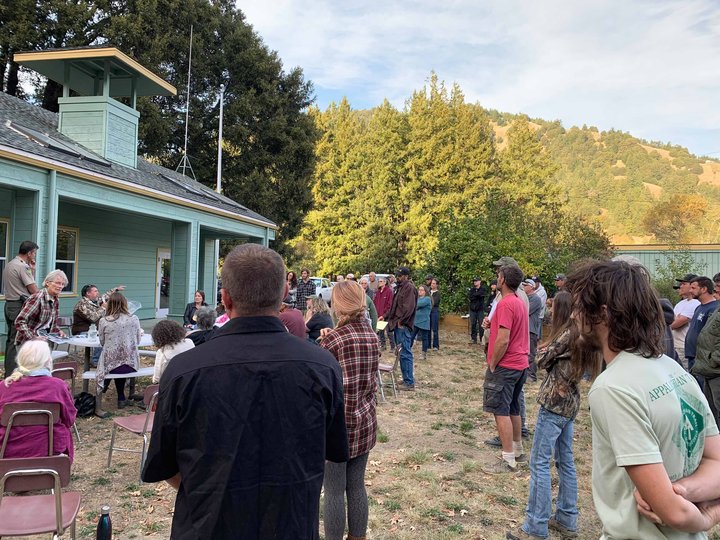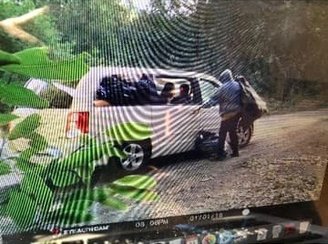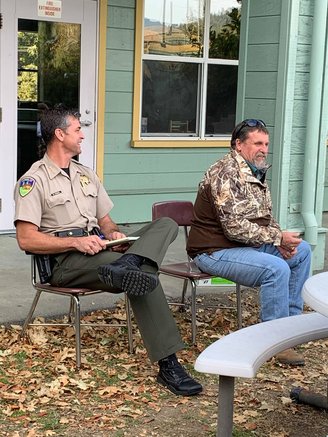
Mattole Valley residents listen to Humboldt County First District Supervisor Rex Bohn as Sheriff William Honsal looks on during a community meeting at Honeydew Elementary School on Tuesday. | Photos courtesy Teresa Davey.
Over the past six weeks or so there’s been a series of late-night cannabis farm robberies in Southern Humboldt’s remote Mattole Valley. Locals say this spate of robberies has been accompanied by some disturbing and suspicious activity.
They’ve seen drones flying low over their properties in the wee hours of the morning and strange vehicles driving aggressively up and down the backroads. One man even reported seeing a group of men in black masks carrying assault rifles.
“It’s plaguing our whole community,” Honeydew resident Sean Stamm told the Outpost in a phone interview this afternoon. The crime spree has reached “borderline epidemic proportions,” he said, with a new robbery or attempted robbery every day or two. “Our community has never seen anything on this level, ever,” Stamm said.
Teresa Davey, another resident of the Mattole Valley (and now a candidate for Second District Supervisor), told the Outpost that the targets seem to be primarily legal cannabis farms — the ones that have been registered with the county and the state, with addresses that are a matter of public record.
”We think people are googling our APN [assessor parcel] numbers and addresses in these rural areas since it’s public knowledge,” Davey said in a message to the Outpost. “It’s happening just about every day, and it’s putting our community in harm’s way.”

Image captured on a security camera appears to show thieves loading bags full of stolen marijuana into a white van.
Locals have been comparing notes and sharing images captured on motion-sensor cameras in hopes of figuring out who’s perpetrating these crimes.
“They seem like outsiders … coming in with rental cars, we think — all newer-model cars and vans and SUVs,” Davey said.
Stamm said that in at least one instance the perpetrator proved to be a former employee of the farm that was hit.
Regardless, the string of robberies shows no signs of abating, and in an area where law enforcement response time is typically 90 minutes or more, residents have taken matters into their own hands.
“It has come to this point where we have to do something,” Stamm said, “because nobody else is going to — and [the robberies] are not stopping.”
A group of Mattole Valley residents has undertaken nighttime patrols, with neighbors taking turns staying up all night to drive the backroads and look for suspicious activity — “taking photos of people out at 3 in the morning, driving around our hills,” as Stamm put it.
They’ve also done something that, until recently, weed growers in this community never would have dared: They’ve asked the Humboldt County Sheriff’s Office for help.
It’s not just the long response time that makes folks out here hesitant to call law enforcement. In a community that’s been growing cannabis illegally for generations, the sheriff’s office has long been considered an unwelcome adversary, an agency capable of destroying people’s lives and livelihoods.
But fed-up locals — many of whom have gone legit with fully registered farms — have been voicing their concerns to Humboldt County First District Supervisor Rex Bohn. Bohn passed the stories along to Sheriff William Honsal, and on Tuesday Honsal and Bohn hosted a community meeting at Honeydew Elementary School.

Honsal and Bohn.
“Rex is my eyes and ears out here,” Honsal told the crowd of roughly 50 people. “I want to get to the point where you’re calling me, too.”
He acknowledged that some locals may still get anxious seeing him in uniform, and he said that as recently as a few years ago this kind of conversation wouldn’t have happened. “We were on different teams, a lot of us,” he said. “[But] we can talk about it now. We’re on the same team now.”
In some ways, the community’s self-reliance may be working against it, Honsal argued. He noted that his department has only gotten half-a-dozen to a dozen 911 calls from Honeydew residents reporting crimes this year. “We are a stats-driven department,” he said. “You guys need to call us. You guys need to let us know when crime occurs here.”
But he also said his department is strapped for resources. “We’re 22 deputies down right now — that’s the reality,” he said. “So I’m having a hard time maintaining our main station, our Garberville office, our Willow Creek office and our McKinleyville office. Those are my focuses right now.”
The goal, once the department is fully staffed, he said, is to have a deputy based in Shelter Cove or the Mattole Valley. In the short term, the sheriff’s office will have overtime patrols working nights in Southern Humboldt, including the Mattole Valley — “because we understand,” Honsal said. “There are people out here looking for crimes of opportunity.”
Most of the time, though, the nearest deputy will still be an hour-and-a-half away. So Honsal spent the bulk of yesterday’s meeting telling local residents how to make their marijuana gardens less attractive to criminals. He compared the situation to McKinleyville residents learning not to leave purses on the front seats of their cars.
“You have to make it difficult to get ripped off,” Honsal said.
He suggested installing fences, motion lights, security cameras and “really strong gates.” He also recommended signage that says there is armed security on the premises, which led a couple of people in attendance to point out that state and federal laws prohibit people from having firearms on property where cannabis is grown.
“There’s a creative way around that,” one woman piped up. Anyone whose cannabis business is organized as a limited liability corporation, or LLC, can register their property in the business’s name and then rent out a portion to themselves as a residence. Then you can then keep the gun in your house and not be in violation of the law.
Honsal was supportive. “You have the right to arm yourself as a citizen,” he said. “You have the Second Amendment. I am a constitutional sheriff.”
Another woman in attendance was hesitant about this suggestion. “There’s lots of people out here with guns,” she said. “We’ve had shotgun shells come through our greenhouse because people thought they were far out in the woods. … It scares me more to say that everyone should be armed and shooting.”
“I’m not saying that everyone should be armed … ,” Honsal responded.”I’m saying you have certain rights as a citizen, as a homeowner, and that [owning a gun] may be a deterrent.”
Then there’s the matter of the drones.
Stamm said people in the valley were initially reluctant to even talk about it among themselves.
“We were skeptical of what we were even seeing,” he said. “I don’t want to be the crazy person spotting drones in the middle of the night.” But as soon as one person spoke up, others admitted that they’d seen the drones, too — humming at low altitude over properties all over the valley.
When the topic came up at yesterday’s meeting, Honsal said state law allows drones to fly over private property, though they have to maintain an altitude of at least 500 feet.
“You have to judge if it’s a security threat or not,” he said. “If you happen to shoot a drone out of the sky because you think it’s a security threat, then they will come after you civilly.” People are also liable if an errant bullet hits a car, building or person. But that doesn’t mean Honsal categorically rejects the idea of shooting down drones.
One woman posed this hypothetical to Honsal: If she were to shoot down a drone that was flying low over her property at 2 in the morning, “you won’t know it unless the owner of the drone calls it in, right?”
“There you go!” Honsal replied with enthusiasm.
Stamm said he thought the meeting went well, and he appreciated Honsal’s advice about how people can fortify their own security measures. Asked if he thinks people will be more likely now to notify law enforcement when their crops are robbed, Stamm said probably so.
“I think [the sheriff’s office] is going to get some more information coming their way, because we really do want help solving this problem,” he said.
But he also plans to continue the late night patrols, even if it means losing sleep.
Honsal has arranged to send a community support organizer to the valley next week to offer even more security tips. It will be like a neighborhood watch meeting, and Stamm said he considers the valley his neighborhood. He and his neighbors plan to protect it. “And if we take out a few of these bad actors,” he said, “hopefully we’ll show the rest of ‘em they shouldn’t be messing around in our valley.”
CLICK TO MANAGE